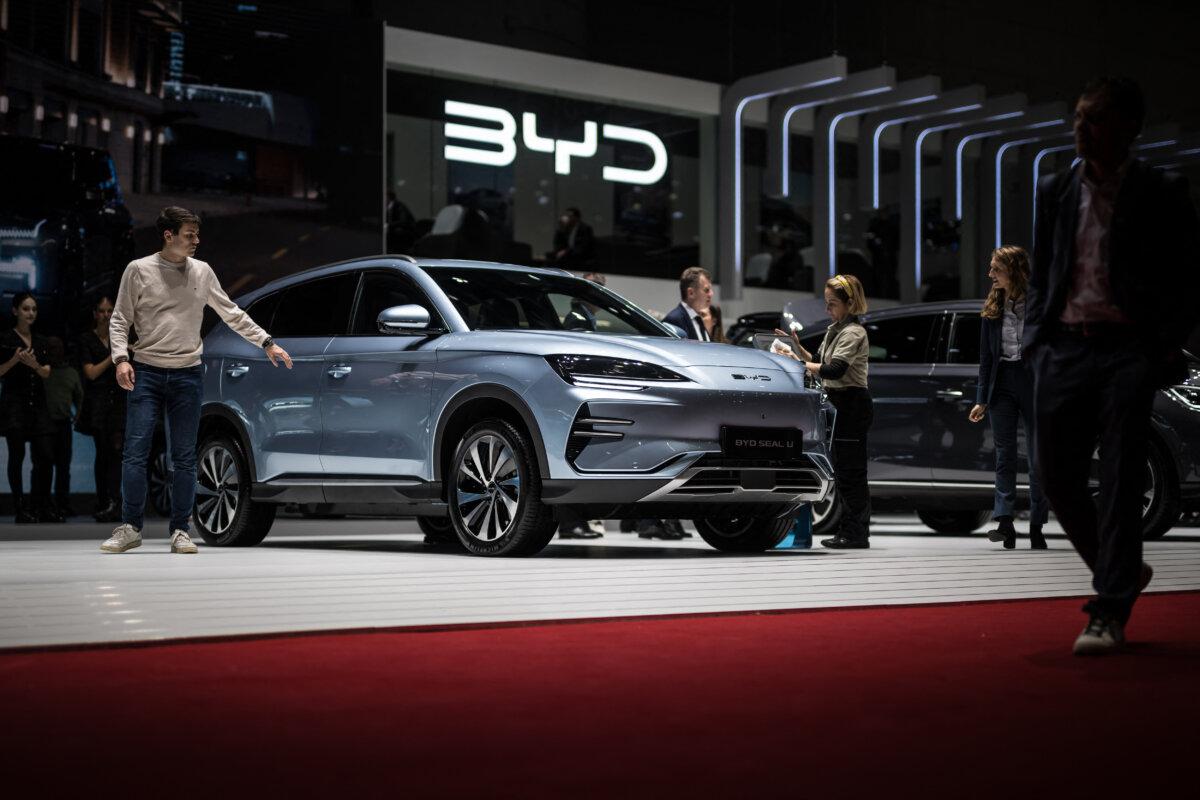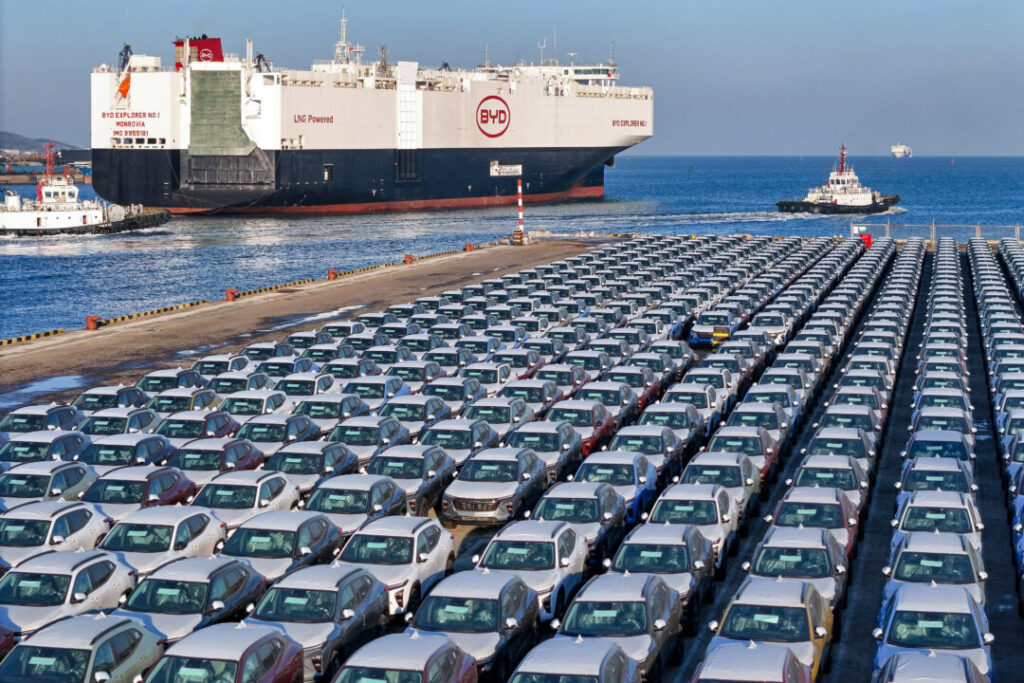The victory for Chinese automakers is temporary and the Chinese administration is misusing gaps in EU policies that could soon be shut down, experts said.
According to an auto market research firm, Chinese carmaker BYD in April sold more battery electric vehicles (EVS) in Europe in Europe than Tesla. Experts warn that this is the result of ongoing discard practices in the global markets of the Chinese administration.
Globally, BYD has surpassed Tesla and has become the world’s largest EV seller. The rapid expansion of Chinese automakers has sparked concerns.
The European Union (EU) has increased tariffs on 45.3% of China-invasive EVs since 2024, citing key subsidies by the Chinese Communist Party, which distorts competition and puts EU carmakers at a disadvantage. Nevertheless, according to a Jato Dynamics report, overall registration of China Origin electric vehicles in April rose 59% year-on-year to nearly 15,300 units.
To continue profits in the EU market and bypass EU tariffs, BYD is building an EV production base in Hungary, which will begin operations in October. In addition, the factory is being constructed in Türkiye, which is scheduled to begin production in March 2026. When fully operational, these two factories have a total production capacity of 500,000 units per year.
Hybrid car
Meanwhile, BYD and other Chinese-based automakers have also significantly increased sales of Plug-in Hybrid vehicles (PHEVs).
In April, BYD’s PHEV sales increased 546% year-on-year from 1,493 units in April 2024 to 9,649 units in April 2025.
“Currently, Chinese car brands account for almost 10% of the total number of registered PHEVs in Europe,” according to Jato Dynamics.
“We still don’t know if the EU will respond to the Chinese-made PHEV boom by imposing tariffs on these vehicles,” said Felipe Munoz, a global analyst at Jato Dynamics.
The European draws to BYD and other Chinese-made cars, particularly EVs, are based on economic considerations, Wang Shiow-Wen, a researcher at the Taiwan Institute of Defense and Security, told the Epoch Times on May 23.
“According to the bar graphs in the report’s data, we cannot conclude that BYD’s European sales outweigh Tesla based on a one-month car registration rate, according to the growth rate in Porsche, Ford, Skoda and other brands, as well as China’s XPENG electric vehicle registration rate.
“It might be more appropriate to interpret this as a sharp drop in sales of Tesla electric vehicles in Europe.”
Analysts have attributed to a decline in Tesla sales, which has halted production since 2024 as Elon Musk has redesigned its US political involvement, aging models lineup, and the popular Model Y.
Some consumers are waiting for the new Model Y to come out in the second half of 2025 before purchasing a Tesla.
“The reliance on Tesla’s singular brand-driven model” and “Elon Musk’s polarizing persona” put Tesla at a disadvantage in competition with BYD in the European market, US-based economist Davy J. Wong told the Epoch Times on May 23.
“BYD, meanwhile, has actively deployed a state-subsidized price investment model, gaining market share at the expense of margins,” he said.
“Importantly, battery supply chain strategies externalize environmental risks. Europe enjoys products, while China absorbs pollution and terminal battery costs, effectively subsidizing BYD’s market entry.”
Take advantage of the gap between EU disputes and policy
“The current success of BYD depends on leveraging internal fractures within the EU,” Wong said.
“While major automotive producers such as France, Germany and Italy recognize China’s EVs as a direct threat, Eastern European countries such as Hungary and Serbia welcome China’s investment as an economic stimulus,” he said.
However, this is temporary and “the geopolitical ruling could bring short-term benefits, but if the EU launches a bloc-wide prevention investigation or enforces carbon-based import restrictions, the regulatory environment could turn very badly against BYD,” he said.
“Europe now represents China’s last major buffer zone for export,” Wong said.
“The vulnerability of European internal sector and green transitions provides a rare, exploitable space as the US tightens restrictions and global demand is stagnating,” he said.
However, according to Wong, this strategy of the Chinese administration is “completely conditioned on internal discrepancies in Europe.”
“If the EU political mood moves to the right or merges around a unified trade defense, the openings could close as quickly as they appear,” he said.

A BYD Seal U model car located on the stands of a Chinese car manufacturer at the Geneva International Motor Show held in Geneva on February 27, 2024. Fabrice Coffirini/AFP
But if the US imposes high tariffs on both Chinese and European products, Wang said, “it encourages China and Europe to deepen trade exchanges.”
“The Chinese influence on the political and economics of Europe may then be deeper and broader,” she said, noting that Europe may be able to influence China’s politics and economy.
“After all, China needs the European market to compensate for the loss of US market share,” Wang said.
BYD’s lead over Tesla in Europe in April is not a final victory, Wong said, “rather than that, the product of structural asymmetry and misalignment of global policy cycles.”
“The sustainability of its benefits depends on whether BYD is able to adapt to the evolving political situation in Europe and whether its globalization strategy has the resilience and responsiveness needed to withstand systemic change,” he said.
Luo Ya and Reuters contributed to this report.



